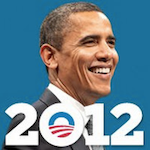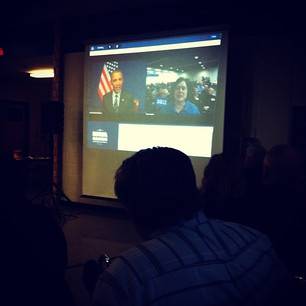Amidst all the Iowa noise from last night and today’s announcement about the end of Michele Bachmann’s presidential bid, something else happened: President Obama quietly joined social photo sharing app Instagram. Obama joined with the username @barackobama and has since posted two photos. The first one is of him speaking via videoconference to Iowa caucus-goers. The second is a photo of people watching the videoconference and is captioned “You guys inspire me every single day.”

This is yet another instance of the president using social media to reach and engage with the younger demographic that helped him get elected four years ago. With the GOP edging in on social media, however, will this same strategy help him win in 2012?
Every presidential candidate is active on social media. Obama was late to the Google+ game, waiting until November 23, 2011, to create a brand page. His campaign team did not bring him onto Google+ when only profile pages were available, whereas GOP candidates Mitt Romney, Rick Perry, Newt Gingrich, Ron Paul and Herman Cain did.

An older Republican gentleman named Ron Paul rode the viral wave last night. If social media could have accurately predicted the Iowa Caucus, Paul would have won. The Wall Street Journal reported that Paul was “drawing heavy support from younger voters, particularly those under age 30.” In the end, that wave crashed and Mitt Romney won, drawing backing from older voters ages 50-and-up.
A 2010 study from the academic journal Mass Communication and Society, looked at college students’ use of social media for political purposes in the 2008 election. Data collected from a Web survey of college students found that “attention to social media was not significantly related to political self-efficacy or involvement.” Online expression, it found, was situational. This sort of situational online political involvement accounts for viral video hits, buzz on Twitter and super-sharing on Facebook. But does it translate to action?
In the case of Ron Paul at the Iowa Caucus 2012, it did not. Romney’s not-as-social media savvy voter based turned out to win it for him.

In 2008, Obama used social media to connect with his audience and win the collective Web mindshare. As he surged ahead and won the 2008 election, his number of MySpace friends and Twitter followers skyrocketed. Obama had discovered a new market, tapping into what was then thenot-as-utilized world of social media to win the election. Today, that world is overflowing with information.
If Barack Obama is going to win, he will have to create the trends that everyone else follows, just like he did in 2008.
At the time, the demographics of Obama’s voters were in line with social media users who were, at the time, mostly Democratic and young.
Fast-forward four years to 2012, and things look a lot different. As we saw in the Iowa Caucus race yesterday, if social media is indicative of anything, it’s that certain candidates are better at creating buzz than others.
If Obama is going to win, he will have to create the trends that everyone else follows, just like he did in 2008. Is he game?
















